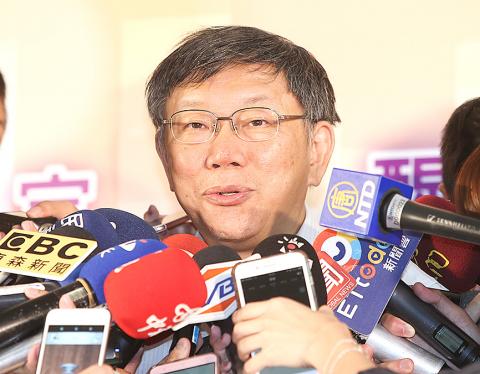Taipei Mayor Ko Wen-je (柯文哲) yesterday refused to sign a referendum petition to change the name the nation would use at the 2020 Tokyo Olympics from “Chinese Taipei” to “Taiwan,” saying that he respects the campaign, but as he is the head of a local government, he would refer to the central government’s stance on the issue.
Ko, who has been taking public buses to Taipei City Hall in the morning since October last year to help promote the use of public and sustainable transport, was approached by a man wearing a blue vest reading: “Team Taiwan Campaign for 2020 Tokyo Olympics.”
“Mayor, are you willing to sign the petition?” the man asked as he tried to approach Ko at a bus stop, but was blocked by three bodyguards who accompany the mayor on his way to work. “Mayor, do you have any thoughts on this issue?”

Photo: CNA
The name rectification campaign, led by a group of civic organizations, was launched in January and passed the first-stage threshold in March. It is now in its second phase, which requires at least 281,745 signatures.
The Central Election Commission has said that proposals should be submitted by Friday to have the best chance of being on ballots in the nine-in-one local elections on Nov. 24.
In response to media inquiries over why he refused to sign the petition, Ko said: “Tolerance is the basis of freedom, but personal freedom is limited to not interfering with other people’s freedom, so while people have the right to express their political ideas, they also have the right to not express them.”
“I am willing to respect the 2020 Tokyo Olympics name rectification campaign, but I do not like being forced or to encounter people who want others to express their political ideas and do so with loud demands,” Ko said. “Frankly speaking, I really dislike this kind of behavior.”
Being mayor of the capital, he would refer to the central government’s stance on the issue, especially because it involves diplomatic matters — before making any decision, he said.

Taiwanese can file complaints with the Tourism Administration to report travel agencies if their activities caused termination of a person’s citizenship, Mainland Affairs Council Minister Chiu Chui-cheng (邱垂正) said yesterday, after a podcaster highlighted a case in which a person’s citizenship was canceled for receiving a single-use Chinese passport to enter Russia. The council is aware of incidents in which people who signed up through Chinese travel agencies for tours of Russia were told they could obtain Russian visas and fast-track border clearance, Chiu told reporters on the sidelines of an event in Taipei. However, the travel agencies actually applied

Japanese footwear brand Onitsuka Tiger today issued a public apology and said it has suspended an employee amid allegations that the staff member discriminated against a Vietnamese customer at its Taipei 101 store. Posting on the social media platform Threads yesterday, a user said that an employee at the store said that “those shoes are very expensive” when her friend, who is a migrant worker from Vietnam, asked for assistance. The employee then ignored her until she asked again, to which she replied: "We don't have a size 37." The post had amassed nearly 26,000 likes and 916 comments as of this

US President Donald Trump said "it’s up to" Chinese President Xi Jinping (習近平) what China does on Taiwan, but that he would be "very unhappy" with a change in the "status quo," the New York Times said in an interview published yesterday. Xi "considers it to be a part of China, and that’s up to him what he’s going to be doing," Trump told the newspaper on Wednesday. "But I’ve expressed to him that I would be very unhappy if he did that, and I don’t think he’ll do that," he added. "I hope he doesn’t do that." Trump made the comments in

New measures aimed at making Taiwan more attractive to foreign professionals came into effect this month, the National Development Council said yesterday. Among the changes, international students at Taiwanese universities would be able to work in Taiwan without a work permit in the two years after they graduate, explainer materials provided by the council said. In addition, foreign nationals who graduated from one of the world’s top 200 universities within the past five years can also apply for a two-year open work permit. Previously, those graduates would have needed to apply for a work permit using point-based criteria or have a Taiwanese company